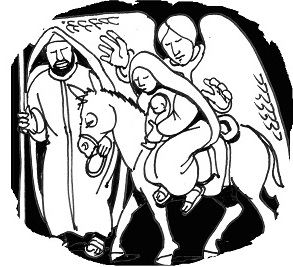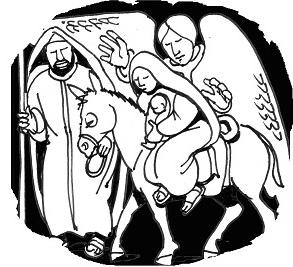

“Put on heartfelt compassion, kindness, humility, gentleness and patience, bearing with one another and forgiving one another” (Col 3:12).
The Holy Family
Sirach 3:2-6, 12-14; Col 3:12-21; Matt 2:13-15; 19-23
Holy Family Sunday follows Christmas and invites us to reflect on the Incarnation as a profoundly human process rooted in family life. While the idea of Joseph, Mary and Jesus as a normal family is difficult to imagine or celebrate as a model, the Scriptures focus on basic values and challenges all human families face.
If Jesus was fully human, he had to develop in a household where the ordinary tensions between obedience and freedom, discipline and love, conflict and growth took place. The author of Sirach was both wise and subtle in describing that a father’s claim was honor while a mother’s role was authority. Isn’t this the plot for every tragedy and comedy portraying family life? From Shakespeare to Dostoevsky, family life is the setting for the core human drama. Fathers must have respect while mothers mediate the tensions between children and their father.
All the virtues Paul described to the Colossians apply to everyone, especially husbands and wives, who set the tone and teach their children how to communicate to resolve differences. We assume the Holy Family had its share of unholy drama amid quarreling relatives and neighbors in small town Nazareth. Jesus could not have survived as an adult if he were not familiar with all the issues real people face.
Matthew presents Joseph as primarily a guardian of the family, alert to threats and effective in removing Mary and Jesus from danger. Joseph is also silent and self-effacing. In Luke’s Gospel, during the two recorded visits to the temple to present the child and later to find the boy among the scholars, Mary is the focus and she does the talking.
The untold story of Jesus’ family life is perhaps only glimpsed in his adult references to families. Of all his parables, the “Prodigal Son” presents a father who does not seek his own honor and is, in fact, more like a mother than a wealthy patriarch. Here is Jesus’ most subversive parable, making God into this kind of father/mother, an Abba who empties himself of all patriarchal privilege. Was this his experience at home and his continual encounter in prayer with the Source of his own emerging identity and vocation? There is so much to reflect on here. How did Jesus become a human being who ended up revealing God? He was raised in a holy family.
The ultimate Holy Family is the Trinity, an ineffable exchange of love among Persons who are beyond gender or any of the defining limits of human parents. Jesus revealed and imitated a self-emptying God whose love is unconditional and extravagant beyond human reckoning. Jesus was formed by such love, and his goal is to form us in this experience as well. Welcome to the Holy Family.
Advertisement




